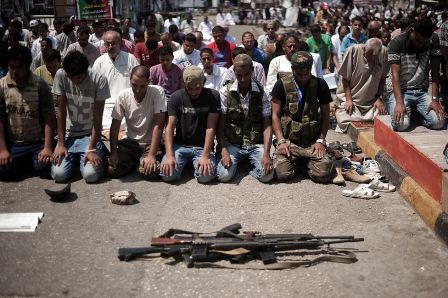
Libya’s National Transitional Council (NTC) officially declared the liberation of Libya on the 23rd October 2011. This was three days after Muammar Gaddafi finally met his fate in a sewage pipe on the outskirts of his home town Sirte.
For 42 years Gaddafi was Libya. He shaped Libyan society to ensure he remained in power, whilst enriching his supporters. Britain and Europe colluded with Gaddafi in much of his 42 years of terror and at the 11th hour when the writing was on the wall for Gaddafi, as the Ummah of Libya rose up to remove him, the west switched sides and decided to get involved in removing him.
The capitalist west will now individually fight over the oil booty of Libya while collectively working to ensure no Libyan leadership emerges that does not support the western agenda even if it is what Libyans want.
Notwithstanding western designs the immediate challenges Libya faces are as follows:
• With Gaddafi gone the unity that prevailed albeit based on the murderous suppression of any dissent has come to an end. Whilst the NTC, an umbrella organisation, has brought some leadership to the many disparate groups and peoples, now the fighting is over and without the common foe divisions may emerge.
• Western interference in the region has kept many a dictator in power. The NATO intervention has further entrenched western influence and their contacts with various groups and individuals during the uprising means they will no doubt want to ensure their interests by backing certain factions over others. Iraq and Afghanistan are stark examples of this even after a decade of so called liberation.
• Libya has the largest oil reserves in Africa. However a weak education system under Gaddafi led to little technical skills developing amongst the people of Libya and as a result an influx of foreign workers and companies dominate Libya’s energy sector. Libya’s economy is also too narrowly focused towards mineral and energy industries accounting for 95% of the Libyan economy.
In overcoming these challenges we make the following recommendations:
• Constitutional change. Unquestionably Islam unites the overwhelming majority of people in Libya – 99 per cent of the population is Muslim. It is thus natural that a new constitution be based on the Qur’an and Sunnah. Islam gives a person a new sense of purpose and this is the same for a nation starting anew after 42 years of brutal rule. Only Islam can unite a people divided between those who gained favour from the former regime, clans and regional tribes and the interim leadership which includes professionals’ from Benghazi where the rebellion began. The way forward for Libya is to establish the Khilafah and elect from amongst them a Khaleefah with the mandate to rule by the Qur’an and sunnah.
• Representation, accountability and rule of law. The constitution should clearly state the obligation of political parties and the establishment of the Majlis ul-Ummah (Council of the People). This mechanism will allow for representation, accountability as well as disagreement in an organised and controlled manner.
• Economy, jobs and growth. Libya’s oil reserves belong to the Ummah according to Islam’s rules on the disposal of public properties and should therefore be used to leapfrog its economic development. Libya possesses 46 billion barrels of oil, the 8th largest in the world. This oil wealth should be used to develop an indigenous and diversified manufacturing industry which will create jobs and economic growth.
• North Africa is supposed to be the replacement for Europe’s Russian energy dependence and this should be used by Libya for technology and skills transfer. This policy of developing the domestic industry will create jobs and economic growth.
• Independent security/defence. According to Sharia sovereignty does not exist unless a nation can secure its borders and is self-sufficient in this. Western military interference must be removed. Gaddafi purposely kept the Libyan army as small as possible to keep himself in power. Before Gaddafi’s fall the Libyan Army using largely Soviet equipment consisted of 25,000 volunteers with and 25,000 conscripts. The various militia rebel groups and armed resistance groups need to be coalesced into coherent military force. In this way the armed forces all follow one policy and this is to protect the nation. This also ensures foreign powers do not make contact with individuals or militias in order to gain influence in the country.
• Foreign relations established on bilateral treaties. The West has used agent rulers, military sales, loans and aid as key tools in keeping political and economic influence in the region. Each of these will need to be deconstructed. Bilateral treaties should be pursued in foreign relations for the purposes of pursuing the nation’s interests and dawa following the example of the Prophet صلى الله عليه وسلم when he established the first Islamic State in Madina.
• Specifically Libya should develop its Armed Forces in particular the Navy in order to protect its coast and to patrol the Mediterranean. This will allow the long term aim of reunification of North Africa. This in turn can be a springboard to carry Islam to Europe and the rest of Africa.
These are the priority areas Libya should focus on. Naturally every new nation faces significant challenges on its emergence. Such policy however will only work if the basis of the nation is adopted by society. Islam is the only common factor between the people of Libya, everything else is foreign and will be too weak to bind the people of Libya together, which will leave it fragmented and open to outside influence.
